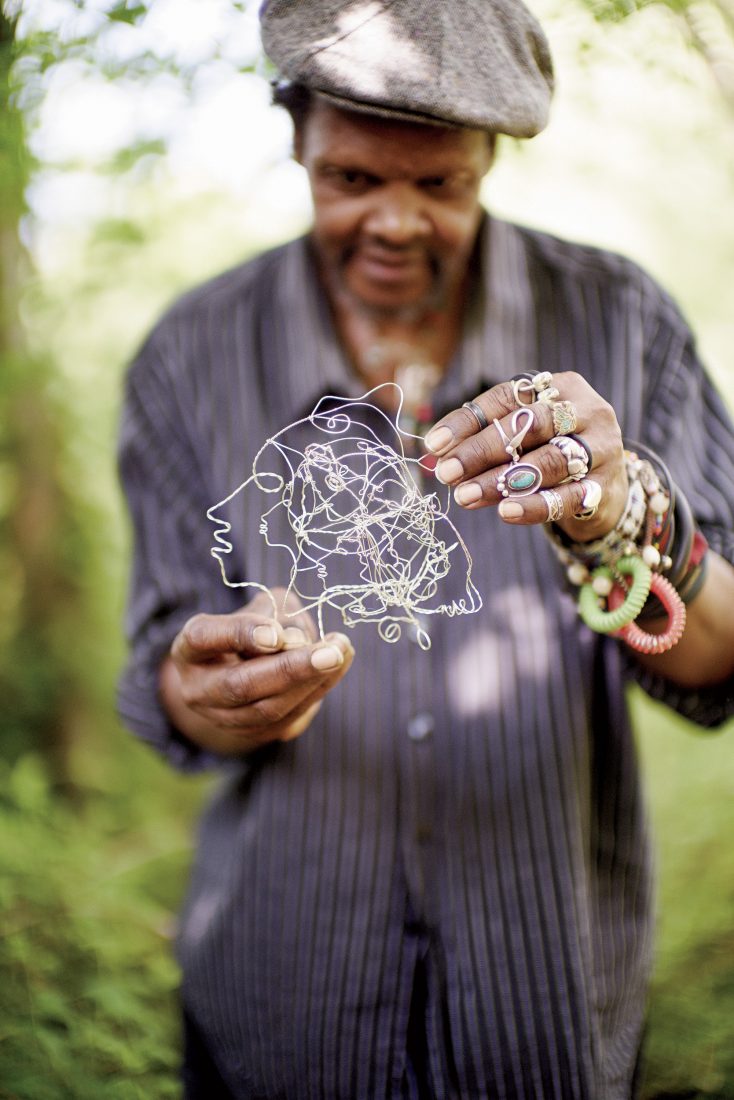Alabama-born Lonnie Holley, the seventh son of 27 children, more or less abandoned as a child, comes from a tradition of African-American visionaries who reach back through the generations to a culture of great aesthetic and ethical sophistication, one which the slaves’ horrific voyage across the Atlantic wasn’t able to obliterate. He is so much himself, that any comparison risks reducing his extraordinary qualities to something so much less than their true worth.
On this rare solo appearance, he played grand piano and Nord digital keyboard – and sang. The songs evolve quite naturally from straight talk and story-telling, as if the feelings behind his words, the memories associated with them, and the spirits they evoked, required the emotional vehicle of song: it is as if we were witnessing the birth of tune-making, out of visceral necessity. Holley sings from the heart, but also from his gut, without a trace of artifice. His words touch on global warming, inequality, race, and God. He is at once disarmingly prosaic, and deeply poetic. His untutored voice – ranging from baritone to falsetto – at times breaking into gentle gospel growl, is plaintive, expressing generations of pain and suffering, the ordeal of his race. And yet his melancholy is resplendent with hope.
 He establishes from the start a heartfelt intimacy with the audience – no stage tricks here – and half way through the set he apologises: “You’ll have noticed I tear up when I sing sometimes…” Such is the depth of his engagement with the content of his laments and his emotional connection with the audience. He is rawness personified, one step beyond (or before) the blues and the gospel cry, with the same soul-stirring mix of despair and hope. If Holley reminded me of anyone – and there is only a deep connection here, not a superficial one – it was the ‘travelling evangelist” the Rev Utah Smith, who could out-shout gospel-blues maestro Blind Willie Johnson any time. Utah who played wild guitar, and sang with unequalled force, while wearing two giant angel’s wings. This is a lineage of urgent music, which doesn’t take you on a predictable trip through familiar song structure, but settles in a succession of deeply touching moments, offering a wake-up call and summoning of presence.
He establishes from the start a heartfelt intimacy with the audience – no stage tricks here – and half way through the set he apologises: “You’ll have noticed I tear up when I sing sometimes…” Such is the depth of his engagement with the content of his laments and his emotional connection with the audience. He is rawness personified, one step beyond (or before) the blues and the gospel cry, with the same soul-stirring mix of despair and hope. If Holley reminded me of anyone – and there is only a deep connection here, not a superficial one – it was the ‘travelling evangelist” the Rev Utah Smith, who could out-shout gospel-blues maestro Blind Willie Johnson any time. Utah who played wild guitar, and sang with unequalled force, while wearing two giant angel’s wings. This is a lineage of urgent music, which doesn’t take you on a predictable trip through familiar song structure, but settles in a succession of deeply touching moments, offering a wake-up call and summoning of presence.
The sounds Holley coaxes out of his Nord keyboard are a-flutter with tremolo and other ear-bending digital effects. He sings of spaceship travel and ascending the stairway to heaven. The texture of his accompaniment evokes perfectly the ethereal nature of his visions and dreams. As with his vocals, there are no fixed tones, only slides between them. The delicate play of various forms of distortion facilitate a kind of aural displacement, or disorientation. This, as in so much African and African-American music, is a tool for connecting to the spirit world, beyond the reassuring habit of everyday consciousness.
Lonnie Holley is also a prolific and inspired sculptor: he creates out of what our society discards, re-enchanting objects that have been consigned to the utilitarian death of the scrap-heap. His work has been shown at the Metropolitan Museum in New York, and many other prestigious institutions. He is celebrated as one of the great living outsider artists of the South, making works which, as Africanist Robert Farris Thompson has written express the "flash of the spirit”. Thompson sees echoes in Holley and other artists’ inspired work of the cult of the nkisi, or spirit-inhabited objects in the Kongo area, from which so many slaves originated. Holley mentioned his mother and grandmother on several occasions during his set at the Cube: these are the channels for the tradition to be passed on from one generation to the next. Holley learned from the mothers, and he continues to teach, in his sculpture and music, summoning the spirit world and “mother universe”which, even at a time of great crisis, offer deliverance. “Humanity,” he says quietly in between songs, “is lost. It is lost, but there is hope.”














Add comment